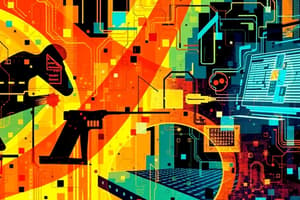Podcast
Questions and Answers
What historical development is mentioned as having influenced criminal law?
What historical development is mentioned as having influenced criminal law?
- The rise of social media
- The creation of online marketplaces
- The introduction of the telephone network (correct)
- The advent of the Internet
Which of the following is a challenge faced by law enforcement in relation to cybercrime?
Which of the following is a challenge faced by law enforcement in relation to cybercrime?
- More resources for investigation
- Less complexity in prosecution
- Increased cooperation between nations
- Difficulty in identifying offenders (correct)
What societal change is highlighted as comparable to the Industrial Revolution?
What societal change is highlighted as comparable to the Industrial Revolution?
- The Rise of Hybrid Work
- The Invention of Renewable Energy
- The Digital Revolution (correct)
- The Expansion of Global Trade
What does Chapter 1 aim to explore regarding computer crime?
What does Chapter 1 aim to explore regarding computer crime?
Which of the following is NOT listed as a learning objective of the text?
Which of the following is NOT listed as a learning objective of the text?
Which type of crime became prevalent with the widespread reliance on automobiles?
Which type of crime became prevalent with the widespread reliance on automobiles?
What type of behaviors does the Internet present that law enforcement must address?
What type of behaviors does the Internet present that law enforcement must address?
Which of the following is an example of a crime unique to computers?
Which of the following is an example of a crime unique to computers?
What type of target can cybercrimes be directed towards?
What type of target can cybercrimes be directed towards?
Which of the following payment methods is NOT mentioned as part of e-Cash?
Which of the following payment methods is NOT mentioned as part of e-Cash?
What is a characteristic of stored value cards?
What is a characteristic of stored value cards?
What concern is raised by the increased reliance on computer-based technology?
What concern is raised by the increased reliance on computer-based technology?
What is the primary difference between computer crime and cyber crime?
What is the primary difference between computer crime and cyber crime?
Which of these is an example of computer-related crime?
Which of these is an example of computer-related crime?
What is a major problem associated with computer crime?
What is a major problem associated with computer crime?
Why might law enforcement agencies struggle to investigate computer crimes?
Why might law enforcement agencies struggle to investigate computer crimes?
What misconception do many people hold about computer crime?
What misconception do many people hold about computer crime?
What aspect complicates court proceedings regarding computer crime?
What aspect complicates court proceedings regarding computer crime?
Which organization is mentioned as challenging new criminal laws related to cyberspace?
Which organization is mentioned as challenging new criminal laws related to cyberspace?
Which is NOT a challenge faced by prosecutors regarding computer crime?
Which is NOT a challenge faced by prosecutors regarding computer crime?
What is the term for crimes that involve the Internet specifically?
What is the term for crimes that involve the Internet specifically?
Which of the following is an example of how cyberspace actions can affect physical reality?
Which of the following is an example of how cyberspace actions can affect physical reality?
Flashcards are hidden until you start studying
Study Notes
Introduction to Computer Forensics and Cyber Crime
- Technological advancements modify criminal law and create new types of crime, such as wire fraud due to telephone networks and auto theft due to increased car use.
- The rise of the Internet introduces new unacceptable behaviors and challenges for law enforcement in crime enforcement.
Learning Objectives
- Investigate societal changes linked to technological advancements and Internet adoption.
- Identify enforcement and prosecution challenges of computer crimes.
- Understand the prevalence and categories of computer-related crimes.
Cyberspace and Criminal Behavior
- The Digital Revolution impacts society on par with the Industrial Revolution.
- Activities in cyberspace can have significant real-world consequences.
- Organizations like the Electronic Freedom Foundation often challenge emerging criminal legislation.
Types of Crime
- Computer Crime: Crimes executed via computers.
- Cyber Crime: Computer crimes specifically involving the Internet.
- Computer-related Crime: Crimes that utilize computers in various capacities, such as the distribution of child pornography.
Problems Associated with Computer Crime
- Law enforcement faces unique difficulties in pursuing computer crimes.
- Courts struggle with jurisdictional issues related to cybercrime.
- There is a common misconception that computer crimes are less serious than violent crimes.
- Prosecutors may prioritize violent crime over cyber cases due to limited resources.
- Many cases of computer crime go unreported due to perceived insignificance.
The Extent of the Problem
- Crimes committed using computers fall into two categories:
- Unique crimes, such as phreaking (hacking phone systems).
- Crimes facilitated by computers, like online child pornography distribution.
- Targeting varies across private and governmental entities.
New Cybercrime: The Emergence of e-Cash
- The growth of electronic commerce necessitates novel payment methods for goods and services, creating opportunities for new cybercrimes.
- Prepaid Cards: Similar to debit cards but not limited by geographic boundaries.
- Stored Value Cards: Often termed electronic purses, utilizing a computer chip for data storage.
- Mobile Payments: Transactions via smartphones enhance payment flexibility.
- Internet Payment Services: Platforms like PayPal facilitate online transactions.
- Digital Precious Metals: Establishing the value of electronic payments in connection with precious metals.
Conclusions
- Increased reliance on technology brings both advantages and challenges, particularly in the realm of crime and law enforcement.
Studying That Suits You
Use AI to generate personalized quizzes and flashcards to suit your learning preferences.




